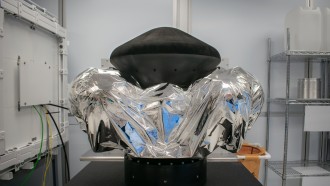Alzheimer's disease has been reversed in patients for the first time, heralding a possible breakthrough in treatment for the disorder.
Cognitive decline often develops in the five million Americans who suffer from Alzheimer's disease. The population of people suffering from the disorder is expected to rise to nearly 16 million by the middle of the 21st Century. Roughly 30 million people worldwide are afflicted by the disease. The aging population is driving researchers to develop new treatments for the disease.
Dale E. Bredesen, of the University of California-Los Angeles and the Buck Institute for Research on Aging, believes he has developed a personalized treatment program that has cured a small number of patients.
Memory loss is not the only consequence of the disease. It is also the sixth-leading cause of death in the United States, taking the lives of more Americans than prostate cancer and breast cancer combined.
More than a billion dollars have been spent during the last ten years, attempting to find a cure for the disease. These have all met with little to no success against the deadly disorder. Many researchers believe the disease could be caused by a combination of molecular interactions.
Bredesen developed the treatment plans, which involve changes to the diet and lifestyles of patients, along with vitamins and meditation. Similar multi-pronged treatment approaches are becoming more popular for doctors treating HIV/AIDS, cancer and cardiovascular disease,
"The existing Alzheimer's drugs affect a single target, but Alzheimer's disease is more complex. Imagine having a roof with 36 holes in it, and your drug patched one hole very well - the drug may have worked, a single 'hole' may have been fixed, but you still have 35 other leaks, and so the underlying process may not be affected much," Bredesen said.
Treatment included elimination of simple carbohydrates from patients' diets, along with processed foods and gluten. Patients practiced yoga to reduce stress, exercised and meditated 20 minutes each day.
Nine of the 10 patients examined in the study saw improvements in cognitive abilities, according to a paper published, announcing the results. Subjects who held jobs before the study began were able to return to work, with improved performance over results before the treatment began.
Earlier research suggests Alzheimer's disease is caused by the build-up of a protein called beta-amyloid within the brain. This was believed to lead to the formation of sticky plaques, destroying nerve cells. This new study suggests the protein is one chemical used by the brain during normal functioning, and that an excess of the substance leads to an imbalance of chemicals, bringing forth memory loss.
Development of the treatment plan and analysis of the results of the research were detailed in the journal Aging.









